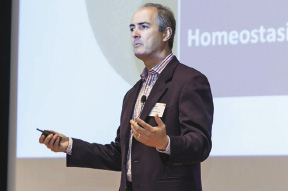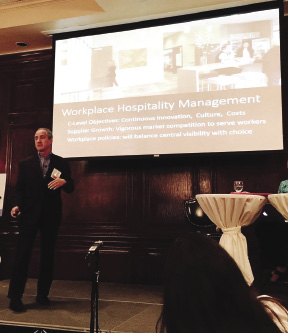The NYREJ recently sat down with John Arenas, CEO of Serendipity Labs, a national coworking brand, for a question and answer session. Arenas served as president and general manager of Regus Americas, and was named one of the 25 Most Influential Executives in Business Travel while CEO of Worktopia.
Q: How did you get your start in the real estate industry?
A: I graduated as a civil engineer from Rutgers University and went to work for Turner Construction building office buildings. After earning an MBA at the University of Michigan's Ross School of Business, I joined Citicorp Real Estate in commercial real estate lending, and then moved on to working for a real estate developer before focusing on building businesses in the workplace industry including Stratis Business Centers, Regus, Worktopia and now Serendipity Labs.
Q: What differentiates Serendipity Labs from the competition?
A: Serendipity Labs is a coworking provider, which means we offer membership to a network of workplaces designed to allow our members to match their workstyle with the right workplace setting depending on what they need to get done; private focused work, meet-up with colleagues, host a team project, or run an off-site planning session. Memberships can include part-time, limited access plans to the shared work environments or full-time dedicated private offices, team rooms or workstations.
Coworking first became popular with independent millennial techie and creative class workers and startups, who were looking for a community to join. One can think of Serendipity Labs as "coworking for grownups." We are positioned between the 20th century "Mad Men" style executive suite offerings like Regus and the collectivist creative class/techie camps like WeWork. Serendipity Labs is focused on creating an inspiring member experience with an engaging workplace design and world-class service that appeals to a broad spectrum of the workforce. Another important distinction is the space and service that we are delivering includes a mix of work settings; collaboration spaces, social spaces and also places for private work. All of our work is centered on unlocking human potential and improving the quality of life of our members. Unlike other offerings, our cloud-based technology platform ensures we meet corporate standards for compliance, technical security, personal safety and reporting, so we can serve as an approved provider of mobility programs for larger organizations across a network of locations.
Q: How has technology shaped the coworking industry?
A: Technology now allows professionals to choose when and where they work. This has "consumerized" the demand for workplace offerings. Paradoxically, while technology has made the workforce more mobile, it has also allowed workers to stay connected and productive outside the traditional office setting. This means that office property owners and companies are competing in a marketplace of offerings that includes third party services like coworking, public spaces, and home-officing. With workers increasingly untethered from the central office, the free enterprise system is responding with a vast array of workplace membership offerings. As a result, the number of coworking locations has grown at over a 70% annual rate for the last five years.
Coworking offerings are also becoming more sophisticated. Not long ago, coworking members could be attracted with good coffee, free Wi-Fi and social interaction in a like-minded community. Today, the bar has been raised, as coworking has become a multi-billion dollar hospitality industry with several lifestyle brands emerging. Leadership and scalable growth in the industry now requires coworking brands to deploy integrated technology platforms that can ensure great customer experiences, security, safety, and access intuitive tools like mobile booking apps.
Q: What does the future hold for the industry?
A: The coworking industry is on a path towards brand segmentation and will be found in all real estate asset classes, not just office buildings. Some brands will focus on the needs of corporate workers for high performance workspace, security and service. Others will continue to serve the down market, creative class and technology sector. As property owners compete for tenants and companies compete for top talent, they will drive demand for coworking to more than 10% of all office space. The near future will also include coworking in hotels, retail centers and residential tower, to address increasingly mobile lifestyles. The massive shift toward workforce mobility will accelerate, as more workers gain responsibility and trust to stay connected and work however they choose.
Q: What does the future hold for Serendipity Labs?
A: In 2015, we're planning to open 20 locations in city centers and suburbs as part of our national expansion. As we build out our network of locations, Serendipity Labs will serve as a strategic outsourced workplace solution to corporate real estate occupiers, enabling them to reduce their real estate commitments and attract top talent. With coverage in urban centers and suburban hamlets, we can serve as a trusted brand for companies and their workers to cut down on commuting, work close to home (but not at home) and meet with colleagues in a professional setting that meets their company standards. We expect that over the next four years we will have over 200 locations operating in the U.S. and Canada.
Q: What is the best advice anyone ever gave you?
A: Do your homework. In other words, over prepare. When you show up prepared you're doing more then 90% of the people in the room have done. What that means is that you will be able to lead the conversation where you want, anticipate and overcome objections and achieve what you set out to achieve. Charisma, connections, perseverance and intellect cannot make up for a lack of preparation. Putting them together is almost unstoppable.
Q: What would you say about failure and how to overcome them?
A: What motivates me to succeed is the joy of building organizations that help people reach their potential and improve their quality of life. At the same time, a healthy fear of failure is also a good motivator. A healthy fear of failure means understanding that failure is a necessary part of the creative process. Therefore, good business builders who can overcome larger failures develop an ability to manage the risk by measuring, iterating and pivoting quickly when there is new information or circumstances have changed. If you're not measuring the business, recognizing problems and adjusting your plan, you're probably not going to overcome obstacles. I learned early on that when things go really wrong, don't look back and lament or point fingers. See what can be salvaged from the experience to make the organization stronger and more resilient and adjust course.

Thanks for Reading!
You've read 1 of your 3 guest articles
Register and get instant unlimited access to all of our articles online.
Sign up is quick, easy, & FREE.
Subscription Options
Sign up is quick, easy, & FREE.
Already have an account? Login here









